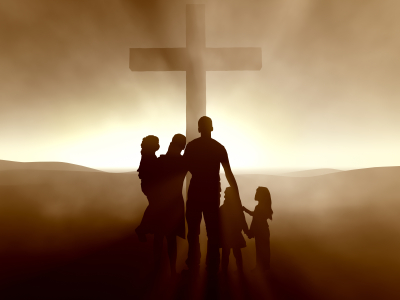We often hear people saying that everyone is a child of God, usually meaning that God has to protect and bless everyone no matter what. However, according to the Bible, this statement is not true. Everyone is God’s creation, but not everyone is a child of God.

Photo courtesy of ©iStockphoto/B-C-Designs
The first and only child of God was Jesus, as I explained in this earlier post. It was Jesus who created the possibility for other people to become children of God, those who believe in him and receive him, through faith (check John 1:12,13 and Galatians 3:26).
The people who make this decision become children of God by adoption, and through this adoption we become God’s heirs, as Paul explains it:
For those who are led by the Spirit of God are the children of God.
The Spirit you received does not make you slaves, so that you live in fear again; rather, the Spirit you received brought about your adoption to sonship. And by him we cry, “Abba, Father.”
The Spirit himself testifies with our spirit that we are God’s children. Now if we are children, then we are heirs—heirs of God and co-heirs with Christ, if indeed we share in his sufferings in order that we may also share in his glory. (Romans 8:14-17)
Paul affirmed that the children of God are led by the Spirit of God, so those who aren’t led by the Spirit, aren’t children of God.
John has also written about characteristics of the children of God:
This is how we know who the children of God are and who the children of the devil are: Anyone who does not do what is right is not God’s child, nor is anyone who does not love their brother and sister. (1 John 3:10)
This is how we know that we love the children of God: by loving God and carrying out his commands. (1 John 5:2)
A child of God loves God, loves their neighbors (the greatest commandments), follows God’s commands, lives according to his will and does what is right according to his Word.
In his letter to the Ephesians, Paul explains that the children of God are imitators of Christ and he lists the characteristics of those who aren’t:
Follow God’s example, therefore, as dearly loved children and walk in the way of love, just as Christ loved us and gave himself up for us as a fragrant offering and sacrifice to God.
But among you there must not be even a hint of sexual immorality, or of any kind of impurity, or of greed, because these are improper for God’s holy people. Nor should there be obscenity, foolish talk or coarse joking, which are out of place, but rather thanksgiving.
For of this you can be sure: No immoral, impure or greedy person—such a person is an idolater—has any inheritance in the kingdom of Christ and of God. (Ephesians 5:1-5)
It was clear for the christians of the early church and the writers of the New Testament that the children of God were a group of people, it didn’t apply to every single person. This group of people had specific characteristics and they could be identified.
As the years and decades and centuries passed, however, the expression “children of God” has turned into a common saying. But God meant it to be something special, something personal. Something that defines a person’s identity. Something that changes a person’s life for all eternity.
See what great love the Father has lavished on us, that we should be called children of God! (1 John 3:1)
